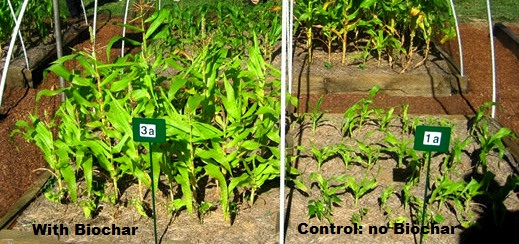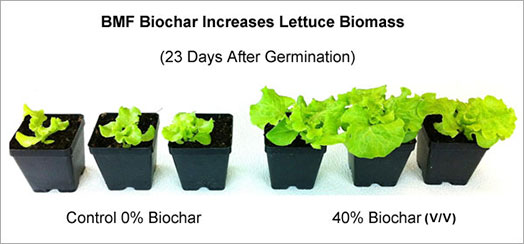Soil Amendment
Biochar is recognised as offering a number of benefits for soil health. Many benefits are related to the extremely porous nature of biochar. 
This structure is found to be very effective at retaining both water and water-soluble nutrients. Soil biologists recognises the extreme suitability of biochar as a habitat for many beneficial soil micro organisms. When pre charged with these beneficial organisms biochar becomes an extremely effective soil amendment promoting good soil, and in turn plant, health.
For plants that require high potash and elevated pH, biochar can be used as a soil amendment to improve yield. Biochar can improve water quality, reduce soil emissions of greenhouse gases, reduce nutrient leaching, reduce soil acidity, and reduce irrigation and fertilizer requirements.Biochar was also found under certain circumstances to induce plant systemic responses to foliar fungal diseases and to improve plant responses to diseases caused by soilborne pathogens.
The various impacts of biochar can be dependent on the properties of the biochar, as well as the amount applied, and there is still a lack of knowledge about the important mechanisms and properties. Biochar impact may depend on regional conditions including soil type, soil condition (depleted or healthy), temperature, and humidity. Modest additions of biochar to soil reduce nitrous oxide N2O emissions by up to 80% and eliminate methane emissions, which are both more potent greenhouse gases than CO2.
Pollutants such as metals and pesticides seep into soil and contaminate food supplies, reducing the amount of land suitable for agricultural production. Studies have reported positive effects from biochar on crop production in degraded and nutrient–poor soils. Biochar can be designed with specific qualities to target distinct properties of soils. Biochar reduces leaching of critical nutrients, creates a higher crop uptake of nutrients, and provides greater soil availability of nutrients. At 10% levels biochar reduced contaminant levels in plants by up to 80%, while reducing total chlordane and DDX content in the plants by 68 and 79%, respectively. On the other hand, because of its high adsorption capacity, biochar may reduce the efficacy of soil applied pesticides that are needed for weed and pest control. High-surface-area biochars may be particularly problematic in this regard; more research into the long-term effects of biochar addition to soil is needed.


